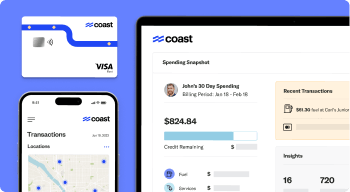Whatever type of business you’re in, if you have company employees who are regularly driving as part of their job, then the issue of mileage reimbursement is bound to come up. After all, driving takes fuel, fuel costs money, and it has to be paid for by someone, somehow.
If you just have employees occasionally using their own vehicles for work purposes, you might be able to get away with handling reimbursement expenses on an “ad hoc” basis, but if you rely on a fleet of company vehicles, you need a game plan.
Handling mileage expenses and reimbursement poorly can lead to wasted money, greater administrative burdens, and frustrated employees, so it’s important that your business gets this right.
In this article, we’ll cover what employers’ obligations are in this area, the benefits of a good mileage reimbursement policy, how to create one, and one way to simplify the whole process.
Table Of Contents
- What Types Of Trips Are Eligible For Mileage Reimbursement?
- What Does The Law Say?
- Reasons To Implement Mileage Reimbursement
- Creating A Mileage Reimbursement Policy
- How To Track Mileage For Reimbursement
What Types Of Trips Are Eligible For Mileage Reimbursement?

The simplest way to think of this concept is that mileage reimbursement is for drives that employees make in the course of carrying out their job duties. A non-exhaustive list might include:
- Making deliveries
- Traveling to an offsite meeting with a client
- Going to a customer’s home or place of business for a service call
- Driving a company vehicle to a maintenance facility
In short, if the purpose of the trip was to perform a job-related task, then it could at least potentially be eligible for mileage reimbursement.
On the other hand, an employee’s daily commute would not be eligible for reimbursement. Using a company vehicle for non-work-related purposes, like going to buy lunch (unless they’re picking up lunch for a work meeting), would also not usually be considered eligible.
Keep in mind that if your company uses a company fleet in its day-to-day operations, then there will be significant, ongoing expenses for fuel. And if employees driving the vehicles are paying for the fuel, then a reimbursement policy is essential.
What Does The Law Say?

When discussing mileage reimbursement, we need to consider both employment law and tax law.
You may be surprised to find out there is no explicit federal requirement under the Fair Labor Standards Act to reimburse employees for mileage. The exception to this is if an employee paying for their own fuel would effectively lower their pay below the minimum wage.
Several U.S. states, including California, Illinois, and Massachusetts, do have their own laws that require employers to reimburse employees for mileage. So make sure to research local laws in the jurisdiction where your company conducts operations.
All of that said, even if you are not actually under a legal obligation to reimburse for mileage, there are still good reasons why you probably should, as we will discuss later.
If you are reimbursing for fuel expenses, there are important tax law considerations. Mileage reimbursement is tax-deductible for employers and is also not considered income for employees.
The specifics of deductions for employers depend on the size of your fleet. For example, if your fleet is less than five vehicles, the IRS allows businesses to choose between a standard mileage rate deduction or deductions based on “actual expenses.” And companies with more than five vehicles must use the actual expenses method.
The standard mileage rate method is based on a rate set annually by the IRS. Currently, it’s set at $0.655 per mile. Fleet managers who use this rate may not deduct any other expense-related costs for their company vehicles.
Under the actual expenses method, you can track and deduct a much wider range of vehicle costs, including fuel, depreciation, lease payments, maintenance registration fees, and more. This requires extremely thorough record-keeping to get the biggest possible deduction.
On the employee side, if the reimbursement rate is higher than the actual expense of driving for work, it can count as taxable income, meaning income taxes for the employee and payroll taxes for the employer.
Reasons To Implement Mileage Reimbursement

There are good reasons your company should reimburse for mileage and have a coherent policy for managing reimbursements, even if no federal or state law actually obligates you to do so.
Staff Morale And Retention
There’s no way around it: If you want to hire and keep good fleet drivers, you need to reimburse for mileage expenses.
Expecting employees to pick up the tab for refueling company vehicles without reimbursement will significantly eat into their wages, leading to discontentment.
For fleet managers, not covering or reimbursing fuel costs is a non-starter.
Tax Benefits
Although the recordkeeping for claiming mileage as a tax deduction may seem daunting, it’s worth it.
If your company depends on a fleet of vehicles, then fuel and maintenance are probably your most significant expenses. That’s why it’s essential to have an effective policy for managing reimbursement so you can offset that expense as much as possible through deductions.
Performance Optimization
The mileage and expense tracking required for reimbursement gives you a clearer picture of your fleet operations overall.
Reviewing miles driven and costs paid for fuel can give you insights into ways you can make your fleet operations more efficient to cut costs and serve your customers better.
Creating A Mileage Reimbursement Policy
Now that you understand the need for properly managing mileage reimbursement, we can consider the fundamentals of creating an effective reimbursement policy for your business.
Understand Driving Costs In Your Region
For your reimbursement policy to serve both your company’s and your employees’ best interests, you need to correctly calculate your reimbursement rate.
Some businesses use the IRS standard mileage deduction rate as their reimbursement rate. However, this is based on a national fuel cost average, and depending on where your business operates, it may be an inefficient choice.
Researching what the typical driving costs are in your region will allow you to set a rate that covers employee expenses without busting the company budget or incurring taxes.
Track By Driver

It may seem convenient to just calculate what you think is a fair flat monthly reimbursement for all your drivers. However, tracking mileage and vehicle costs for each individual driver can save you money.
Tracking on a driver-by-driver basis can also help you better understand potential sources of inefficiency in your operations.
Communicate Policy Clearly
Any company policy can only benefit the company to the extent it’s actually followed. Your company’s mileage reimbursement policy won’t be effective unless all of your affected employees understand it and are on board.
Make sure drivers understand what’s required of them in terms of mileage and expense logging and that they can’t rely on being reimbursed unless they provide the necessary information.
How To Track Mileage For Reimbursement
Getting the full benefits of mileage and vehicle expense reimbursement requires several steps.
The Manual Way

- Create a logbook for each vehicle.
- Have drivers record mileage driven for every business-related trip in the logbook.
- Record other details, such as the purpose of the trip, starting and ending odometer mileage, and expenses incurred along the way such as tolls.
- Save and turn in any receipts.
Automated Solutions
Tracking fleet expenses the traditional way — as outlined above — requires a lot of tedious effort from drivers, and even the best ones will sometimes forget and make mistakes.
Many would argue the better way to handle fleet expense tracking is with telematics — a set of systems and vehicle add-ons that use the Global Positioning System (GPS) and on-board diagnostic (OBD) equipment to plot movement on a computerized map.
Telematics can automatically record data on vehicle mileage, speed, fuel consumption, idling time, and other “vital statistics,” and then send it to a fleet management software reporting dashboard.
Compared to traditional logging, telematics can give you more accurate data.
Alternative: Using Fleet Fuel Cards
Another way of greatly simplifying the problem of managing fleet fuel expenses is by getting a fleet fuel card. This is a specialized type of company credit card usable only at service stations to allow your drivers to conveniently pay for refueling their company vehicles.
Fuel card transactions all appear on your billing statement, and you may be able to set up additional spending controls and metrics for tracking things like current vehicle mileage or driver number.
Using a fuel card can greatly streamline your fleet operations because you don’t have to collect receipts and process reimbursements, and your employees don’t have to save and turn in receipts and then wait to be reimbursed.
Rubber Meets Road: The Bottom Line

If your business relies on a company fleet, then getting vehicle expense tracking and mileage reimbursement right for vehicle expenses is essential for cost control and staff retention.
An effective mileage reimbursement policy has many moving parts. Using telematics and fleet fuel cards can dramatically cut down on the work required for both managers and drivers and also provide more accurate data.
The Coast fleet and fuel card provides real-time expense tracking and a powerful online management platform, as well as Visa acceptance, gas discounts, advanced spending controls, and security alerts.
To learn more about Coast, visit CoastPay.com today.


